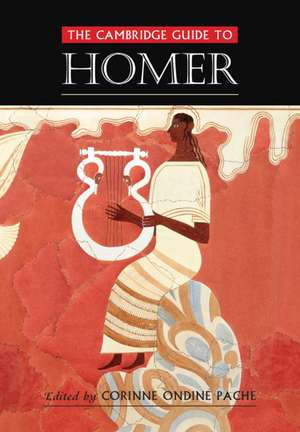The Cambridge Guide to Homer
Editat de Corinne Ondine Pache Casey Dué, Susan Lupack, Robert Lambertonen Limba Engleză Hardback – 4 mar 2020
Preț: 1288.05 lei
Preț vechi: 1672.79 lei
-23% Nou
Puncte Express: 1932
Preț estimativ în valută:
246.47€ • 254.27$ • 205.68£
246.47€ • 254.27$ • 205.68£
Carte disponibilă
Livrare economică 06-20 martie
Preluare comenzi: 021 569.72.76
Specificații
ISBN-13: 9781107027190
ISBN-10: 1107027195
Pagini: 724
Ilustrații: 35 b/w illus.
Dimensiuni: 185 x 260 x 38 mm
Greutate: 1.63 kg
Editura: Cambridge University Press
Colecția Cambridge University Press
Locul publicării:New York, United States
ISBN-10: 1107027195
Pagini: 724
Ilustrații: 35 b/w illus.
Dimensiuni: 185 x 260 x 38 mm
Greutate: 1.63 kg
Editura: Cambridge University Press
Colecția Cambridge University Press
Locul publicării:New York, United States
Cuprins
Part I. Homeric Song and Text: 1. Introduction; 2. Homeric epic in performance; 3. Homeric poetics; 4. Homer in a world of song; 5. Epic traditions; 6. Mythic background; 7. The language of Homer; 8. From song to text; 9. Achilles; 10. Ancient Near Eastern epic; 11. Batrakhomuomakhia; 12. Catalogues; 13. Dreams; 14. Early editions; 15. Ekphrasis; 16. Epic cycle; 17. Epithets; 18. Formula; 19. Gods and goddesses; 20. Hesiod and Homer; 21. Home; 22. Homer and Indo-European myth; 23. Homer and the alphabet; 24. Homeric body and mind; 25. Homeric dialects; 26. Homeric humor; 27. Homeric hymns; 28. Homeric scholia; 29. Hospitality; 30. Iliad; 31. Immanence; 32. Kleos; 33. Lament; 34. Margites; 35. Meter; 36. Narrative; 37. Odysseus; 38. Odyssey; 39. Panathenaia; 40. Panhellenism; 41. Pisistratus; 42. Rhapsodes and Homeridai; 43. Ring composition; 44. Similes; 45. Speech; 46. Trojan horse; 47. Troy; 48. Type scene; Part II. Homeric World: 49. Introduction; 50. Homeric communities in the Homeric epics and early Archaic Greece; 51. Homeric religion; 52. Homer and history; 53. Homeric geography; 54. Homeric materiality; 55. Afterlife in Homer; 56. Assemblies and councils; 57. Athletic competition; 58. Basileus and Anax in Homer and Mycenaean; 59. Carl Blegen; 60. Boar's tusk helmets; 61. Burial practices; 62. Catalogue of ships and archaeology; 63. Catalogue of ships: literary aspects; 64. Class relations; 65. The literary tradition of destruction of cities; 66. Divine epiphany in Homer; 67. Family and marriage in Homer; 68. Feasting and drinking in Homer; 69. Archaeology of hero cult; 70. Hittite literary evidence; 71. Homeric archaeology; 72. Homeric economy; 73. Household organization; 74. Lefkandi; 75. Mycenae; 76. Nestor's cup; 77. Nostoi; 78. Offerings in Homer; 79. Personification in Homer; 80. Prayers and vows; 81. Pylos; 82. Religious festivals in Homer; 83. Heinrich Schliemann; 84. Shield of Achilles; 85. Slavery in Homer; 86. Supplication in Homer; 87. Troy and its treasures; 88. Warfare in Homer; 89. Warrior graves; 90. Weapons and armor; 91. Women in Homer; Part III. Homer in the World: 92. Introduction; 93. Homer in antiquity; 94. Homer and the Latin West in the Middle Ages; 95. Homer in Greece from the end of Antiquity: 1. The Byzantine reception of Homer and his export to other cultures; 96. Homer in Greece from the end of Antiquity: 2. Homer after Byzantium: from the Early Ottoman Period to the age of nationalisms; 97. Homer in Renaissance Europe (1488–1649); 98. Homer in early modern Europe; 99. The reception of Homer since 1900; 100. Homer: image and cult; 101. Albert Bates Lord; 102. Allegory and allegorical interpretation; 103. Aristotle and Homer; 104. Athens and Homer; 105. Biographies of Homer; 106. Chaucer and Homer; 107. Dante and Homer; 108. Homeric question; 109. Milman Parry; 110. Plato and Homer; 111. Plutarch and Homer; 112. Shakespeare and Homer; 113. Sponde Jean de and Homer; 114. Vergil and Homer; 115. Weil Simone and the Iliad.
Recenzii
'The entries are very well written … Recommended.' H. M. Roisman, Choice
Descriere
Drawing on anthropology, philology, linguistics, history, archaeology, cultural and literary studies, this book presents and synthesizes the best Homeric research available.
